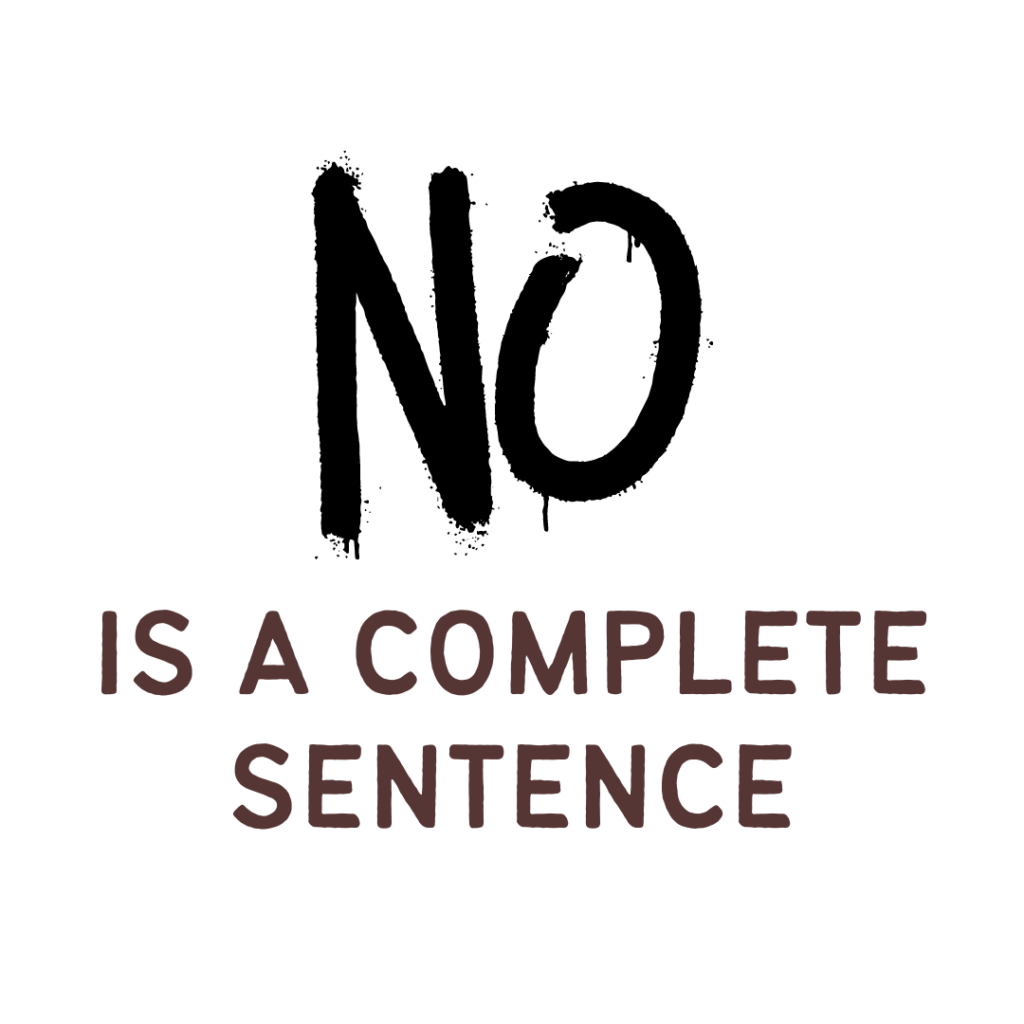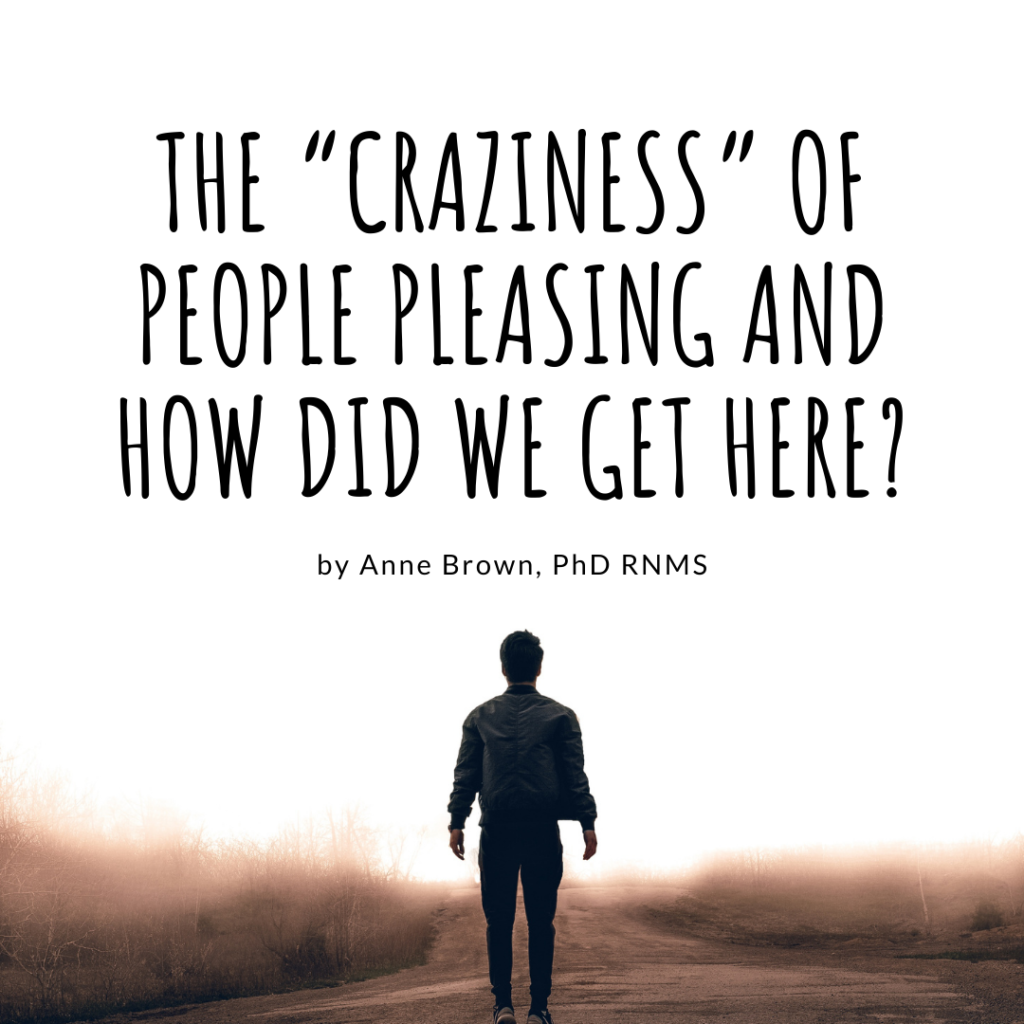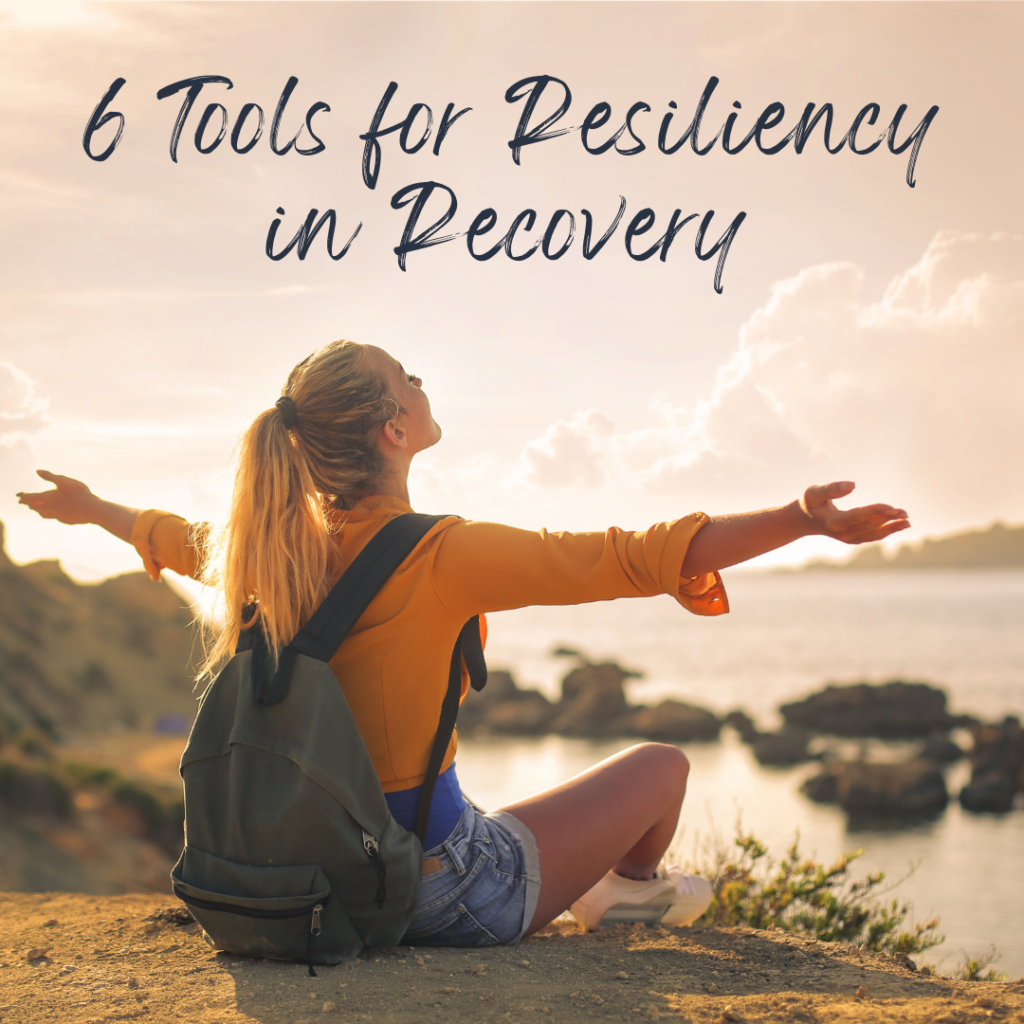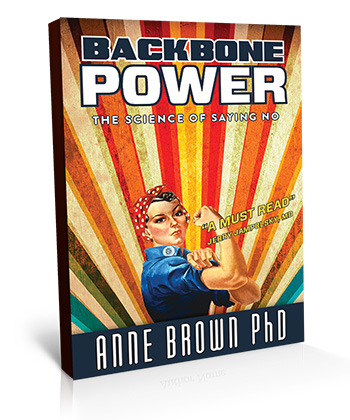Backbone Tools: From Codependency to Dignity

If you grew up in a family with lots of dysfunction e.g. alcohol, anger, illness physical or mental, Borderline/narcissistic (it is all about me), or any other phenomena other than adult people being normal loving parents to their children you may have developed the symptoms of codependency.
Quick test for you to ask yourself if you subscribe to any of these: “don’t rock the boat”, “everyone needs to like me,” “I hate conflict”, “asking myself what is important to me” is selfish,” if people really knew me they would know I was a fraud”. If the answer is YES, heads up and read on. Click here.
NO is a Complete Sentence!

If you are afraid to say No in an equal-status relationship, it is time to re-evaluate. Do not say No if you fear physical violence. If you were raised with abuse, addictions, or extreme dysfunction it may not have been safe to say No. If you are out of those situations it is time to learn how to say No.
Read more here.
The “Craziness” of People Pleasing and How Did We Get Here?

What is this phenomenon called “I need to make everyone in the world like me or people pleasing?” This is a tough concept because in one-way people pleasers are nice to be around. If we look deeper we have to ask at what cost? People pleasing can affect both men and women.
Read more here.
The Insidious Killer in Recovery!
Living without a backbone sets you up for severe consequences in the domains of health, finances, career, friendships, romance, recovery, and your dignity for starters. Read more here.
6 Tools for Resiliency in Recovery

Resiliency and Recovery have a nice ring. The two R’s! Having a backbone makes this process a lot easier.
Resiliency is having the ability to adapt in the face of adversity. The more you know yourself, the greater your self-awareness, and the greater your backbone, the greater your chance for success in your recovery.
Resiliency is also what NORMAL people can do during adversity that leads others to say these people are extraordinary. Remember: Resiliency, I repeat, is what normal people are capable of doing! Read more here.
To Love From Recovery: 5 Tips for Success!
We will look to some of our strong recovery tools for answers to having a strong, successful love relationship.
Many very wise people have told us “If you can’t love yourself, you can’t love anyone else.” It is important to love yourself in order to have a successful recovery. When you start here and apply a few principles, you can make your relationship with yourself, your recovery, and with others work.
If you’re a people-pleaser, allow yourself to be abused by others, or become a victim, it is always at the cost of loving yourself. Unfortunately, this leads to becoming a victim in your recovery. Read more here.
Internalize Your Recovery for Success: No Self-Esteem, No Problem!
Knowing something is one thing and putting it into action is another. Recovery is an area where the action part is paramount! So how do we do this? How do we take what we learn from books, talking, and screens and put it into action?
Practice Saying No
Personally, I believe if my clients haven’t “modified their bodies” or “internalized the learning,” we don’t have success. I have also heard “I don’t feel good enough about myself to say ‘no’ to what is bad for me and ‘yes’ to what is good for me.”
Read more here.
Reinventing the Concepts of Recovery
Wouldn’t it be great if we could wave our magic wand and no one would relapse? Until we understand more about addictions (and we have work to do there), we will have to tackle relapse in other ways. Let’s look at a couple of possible breakdowns that might lead to relapse and find some ways to avoid the traps.
First of all, everyone is different. We can give a general plan and it is up to you (with your team) to make it specific to your vulnerabilities.
In working with my clients, here are a couple of key areas I’ve found that need to be addressed: Click here
Recovery With a Capital R!
Recovery is not something you just fall into because you stopped your addiction. It is imperative that you view Recovery as Active, Alive, Constantly Changing, a Verb…and something you never take for granted. Read more here
How to Get the Best Out of Your 12-Step Meeting!
Attending a support group can be a very positive part of your recovery plan, as long as you understand what is healthy and what is dysfunctional. Let’s look at a few qualities of support groups and what happens when things get out of balance… Read more here
What Our Athletes Can Teach Us About Recovery!
Last summer 2016 in particular, we had some pretty spectacular athletic competitions in England, France, and more recently, Rio. Whether you follow cycling, tennis, or any of the competitions that took place in Rio, it is hard not to be inspired and learn from some of the stories. Read more here.
The Underbelly of Being Nice

Why do people fight so hard to be sweet, nice, and accommodating, rather than honest, genuine, and authentic? It is a great question. Cultures are set up and rewards are given if you follow the rules: always say yes, agree to everything, be nice, don’t rock the boat, and tell people things you think will make them feel good and like you. What can possibly go wrong?
Let’s take a look at the cost… Click here
Why is Giving Up People Pleasing So Difficult
This question fascinates me because I have observed over many years many journeys where people struggle with this task (myself included.) Let’s take a look at some of my speculations and see what your thoughts might be on why this is so challenging. Read more here.
Codependent or Loving? Part I
How do I know if I am acting codependent or loving? This is an excellent question and often confusing for many different reasons. Let’s look at the definitions of codependent and loving and see what we find.
Love: An intense feeling of deep affection. For the purpose of this article, we will include some distinctions of love:
- Truth
- Strong
- Energizing
Codependency: Codependency for the purpose of this discussion is a recognizable system of learned personality traits that negatively affect knowing one’s self and others. Continue reading here.
Codependent or Loving? Part II
Remember our question from Part One: How do I know if I am acting codependent or loving? Also, let’s review our definitions of “codependent” and “loving”:
Love: An intense feeling of deep affection. For the purpose of this article, we will include some more distinctions of love:
- Brave
- Kind
- Trusting
Codependency: Codependency, for the purpose of this discussion, is a recognizable system of learned personality traits that negatively affect knowing one’s self and others. Codependents become dependent on “others’” approval and control the situation in order to get this approval. Codependents often avoid honesty and confrontation, which can enable abusive behavior. Thus, the codependent does not require the abusive person to change or improve. Read more here.
Codependency and Contentious Times – Part I
Probably the one area we can all agree on is the idea that “these are contentious times.” What do contentious times in our country (if not the world), mean to the codependent?
First, let’s go back to our definition of codependency: Codependency is learned personality traits that negatively affect knowing one’s self and others. Codependents become dependent on “others’” approval and attempt to control the situation in order to get this approval. Codependents often avoid honesty and confrontation, which can enable abusive behavior.
Codependency and Contentious Times (Part II)
In Part I, we identified some areas of concern for the codependent during these contentious times. Now let’s look at some possible tools for the codependent to use.
If you haven’t done your codependent work, now is the perfect time to begin. With social media, you can practice taking a stand for what is important to you. Post articles you think are important for people to read. Stand up to people who post contentious comments. Read the full article here
Codependency and Narcissists: What Could Possibly Go Wrong? (Part I)
For this discussion, we are going to stick with our understanding of codependency as a system of distortions that exists on a continuum. Codependents learn personality traits that interfere with knowing one’s self and others. The people-pleasing aspect of codependency might drive the ignoring of who we are trying to please. The focus on wanting approval may keep us from acknowledging abusive behaviors coming from the very person whose approval we seek. The need for harmony might prevent us from realizing we are enabling abusive behavior. Or any combination of the above. We don’t have the tools to deal with abusive behavior, so this also drives us to avoid bringing it to consciousness. And we probably have a history of being abused or exploited, so it feels familiar.
What do we have now? A green light for perpetrators. When we have a society of codependents, they become a magnet for the narcissists of the world. Read the full article here
Codependency and Narcissists: Let’s Make Something Go Right! (Part II)
In Part I, we discussed how the codependent is a perfect victim for the narcissist. We discussed our working definition of codependency: a system of distortions that exists on a continuum. Codependents learn personality traits that interfere with knowing one’s self and others. Codependents take care of others, often ignoring or tolerating their abuse, avoiding confrontation, and enabling the “bad” behavior. Narcissists, on the other hand, come with three significant distinctions: grandiosity, seeking excessive attention, and lack of empathy. Read the full article here
Common Sense Ways to Stay Friends With a Victim
Are you frustrated with someone you care about who appears to be the victim of a perpetrator? Do you find yourself getting angry with this person?
We all have examples of these situations and we often struggle with what to say, how much time to spend with the victim, and how to continue being their friend. Some common examples of these situations might be:
- Your best friend keeps bailing out his/her partner from the consequences of his/her addiction.
- Your parents keep giving money to your clearly addicted sibling.
- Your child rationalizes the emotional abuse he/she is receiving daily from his/her spouse.
- Your best friend always has a story for why she can’t do things with you and/or might have questionable bruises.
- One parent continues to rationalize the abusive behavior of the other parent.
Common Sense Tools for the Friend of Someone Who is Brainwashed!
Most of us know or have known someone we care about who has come under the influence of a perpetrator using him/her for self-serving purposes.
Very smart, educated, healthy people can, for some unknown, reason come under the spell of opportunistic, toxic, and insecure people. It is very puzzling for an observer of this phenomenon to understand how the brainwashed person can’t see what is happening.
How it happens is a complicated process that we won’t address here. How we can help these people as a friend is, however, something we will tackle here. You will also see similarities to our conversation regarding befriending victims. But being brainwashed by another, in my assessment, is much more complicated and dangerous. When someone is brainwashed they may be at risk of joining a cult and blindly following the orders of that cult.
Sex and Codependents: What Could Possibly Go Wrong?
So many women I interviewed when writing my book reported saying yes to sex just to get the sex over with and have the person go away. Others reported saying yes to sex to have a person like them. Others reported gaining weight so they wouldn’t have to say no to dating and sex. Many reported losing weight, feeling attractive, and wanting to put the weight back on so they wouldn’t have to deal with dating and sex games. Others reported being raped because when they said no, it wasn’t respected. Many reported drinking too much, knowing they had been taken advantage of sexually and not remembering the specifics.
The stories go on and on and, except for being raped, they all have one thing in common: the inability to say no when you mean no. Read the full article here




















 Facebook
Facebook LinkedIn
LinkedIn Twitter
Twitter Youtube
Youtube StumbleUpon
StumbleUpon